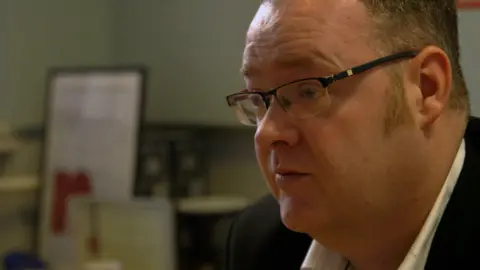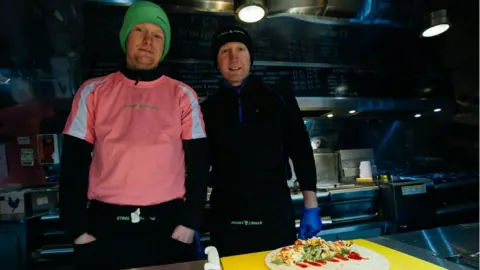'I was stabbed nine times and had a hatchet in my head'
Knife crime in England and Wales is rising, but an initiative in Scotland has seen a significant fall in the number of stabbings. Does the rest of the UK need to rethink the way it deals with knife crime?
"I've nearly had my arm severed off. I've been stabbed in the head - fractured skulls, stabbed in the back, punctured lungs, countless, countless times. It's amazing I'm still alive," Callum, 26, tells the BBC's Victoria Derbyshire programme.
Growing up in the east end of Glasgow, where violence "just seemed normal", he started fighting aged just 12 and was taken home by police at 13 after carrying an offensive weapon.
"Some people used to go out and play football, we used to go out and try and stab each other," he says.
"Assaults, robbing and rioting, carrying offensive weapons, breaching of the peace, stuff like that - just continuously getting myself involved with the police."
Violence disease
In 2005, a UN report found Scotland was the most violent country in the developed world, with Glasgow in particular notorious for gangs.
Then, the authorities began to change their approach.

The Violence Reduction Unit, government-funded and run at arm's length by Police Scotland, was set up.
It took a "public health approach" to violence, treating it like a disease and dealing with the causes rather than the symptoms.
First, it dealt with Glasgow's gang problem, with a "call-in" attended by about 200 gang members.
They were told if they did not quit violence they would be arrested, but if they wanted to leave the gang life they would be given support to help them change.
The gangs still exist, but in much smaller numbers.
The Violence Reduction Unit's key work was around changing attitudes, challenging the perception that everyone had to carry a weapon.
Will Linden, acting director of the unit, says: "A lot of our knife assaults were happenstance.
"People were being caught in fights and someone was taking a knife out and stabbing someone.
"So, if you remove that knife from the situation by addressing the misconception about it, the seriousness of the violence reduces."
At the same time, the police continued with the use of stop and searches. Prison sentences for carrying a knife were increased from two to four to five years.
The unit also established a number of programmes - working with people in education, health and social work across Scotland - all geared towards reducing violent crime.
One of these, called Navigator, is run in hospitals in Edinburgh and Glasgow.
Its workers speak to anyone who attends an accident and emergency unit, particularly after people have been stabbed, to use that moment to try to turn lives around.

That might be helping them get clean - engaging them with community organisations or helping them find appropriate housing - anything to help break the cycle of addiction and violence.
And a year ago Callum was one of those people.
"I was stabbed nine times and a hatchet was put in my head. My son witnessed all this though the window because it was right outside my house," he says.
"I was getting sick and tired leading the life I was leading. I didn't know how to change my life because I'd been doing it for so long."
It was in A&E that he was approached by a Navigator who said they could show him how to escape his life.
"I grabbed it with both hands because I kind of knew I was running out of chances," he says.
Their first achievement was to help him to stop drinking, which Callum says had been the underlying cause of his problems.
'Saved my life'
The Violence Reduction Unit's work has helped to almost halve Scotland's homicide rate in the past 10 years.
Last year, more than 35 children and teenagers were killed with knives in Britain, but none were in Scotland.
Latest figures show a 26% increase in knife offences in England and Wales on the previous year and the highest number since 2011, the earliest point for which comparable data is available.
Scotland's Justice Secretary, Michael Matheson, says: "It's not just more police officers or increasing sentencing powers for our sentences within the courts... it's about working with organisations and working an approach that helps to reduce the risk of young people from getting involved in the future.
"I certainly see that as an approach that I think could help England in tackling some of these issues."
Callum is now part of another of the Violent Reduction Unit's programmes - Street & Arrow - which provides employment and training to offenders with a violent past, in a food van.
"I don't even know if I'd be alive. So it has literally saved my life. And it's saved other people's lives. The effect of engaging with me is massive," he says.
"It's helped my son, it's helped my daughter, it's helped my mother, it's helped everybody in my community, because I'm not running about involved in violence anymore."
Watch the BBC's Victoria Derbyshire programme on weekdays between 09:00 and 11:00 on BBC Two and the BBC News channel.
